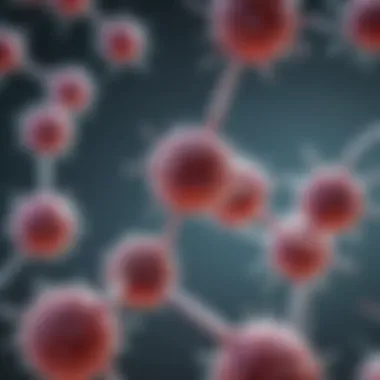Monoclonal Antibody Treatment for Prostate Cancer


Overview of Research Topic
Monoclonal antibody treatments demonstrate a promising approach in the management of prostate cancer. Prostate cancer remains one of the most prevalent cancers among men worldwide. The evolution of treatment modalities has led to advancements in targeted therapies, with monoclonal antibodies at the forefront. This section examines the development and significance of these therapies, emphasizing their unique mechanisms of action and current applications within clinical settings.
Brief Background and Context
Monoclonal antibodies are engineered proteins that can specifically target antigens on cancer cells. The concept of using these antibodies emerged in the late 20th century and has since gained traction in various cancer treatments. In prostate cancer, monoclonal antibodies aim to enhance the immune response against tumor cells, making them a critical area of study. With advancements in biotechnology, monoclonal antibodies like ipilimumab and nivolumab have paved the way for more effective cancer therapies.
Importance in Current Scientific Landscape
The rise of monoclonal antibody treatments marks a significant shift in cancer therapy, emphasizing precision medicine. More than just a treatment, these antibodies offer insights into the molecular underpinnings of prostate cancer. The integration of these therapies into clinical practice is reshaping outcomes, offering new hope for patients and healthcare professionals.
Methodology
This analysis employs a comprehensive literature review to assess the efficacy and implications of monoclonal antibody treatments for prostate cancer.
Research Design and Approach
The study reviews existing clinical trial data, peer-reviewed articles, and meta-analyses. By examining various studies, the research identifies trends in treatment efficacy, side effects, and long-term outcomes for prostate cancer patients. This approach ensures a well-rounded understanding of current treatment protocols and emerging trends.
Data Collection Techniques
Data was gathered from reputable medical databases such as PubMed and clinical trial registries. Articles were selected based on relevance, publication date, and impact factor. Both qualitative and quantitative analyses were utilized to synthesize findings, highlighting key developments in monoclonal antibody therapies for prostate cancer.
Foreword to Monoclonal Antibodies in Oncology
Monoclonal antibodies have emerged as a significant component in the landscape of oncology treatments. This is especially pertinent in the context of prostate cancer, where traditional therapies often encounter limitations regarding efficacy and specificity. Monoclonal antibodies are engineered to target specific antigens found on cancer cells, providing a more tailored approach to treatment. These therapies can enhance the immune response against tumors, facilitating a targeted destruction of cancerous cells while often minimizing damage to surrounding healthy tissues.
The relevance of monoclonal antibodies in oncology extends beyond their initial development. They have been integrated into various treatment protocols, often serving as adjuncts to existing therapies or even as primary treatments in certain cases. Their versatility allows clinicians to implement them across a spectrum of malignancies, providing new hope for patients with resistant forms of cancer. As we delve deeper into this article, we will explore the mechanisms of action, historical context, and the clinical applications of these powerful agents in the treatment of prostate cancer.
Definition and Mechanism
Monoclonal antibodies are identical copies of an antibody formed by a single clone of immune cells. They are designed to bind specifically to a unique target, commonly known as an antigen. The mechanisms by which they exert their therapeutic effects are multifaceted. They can mark cancer cells for destruction by the immune system, block growth signals, or deliver cytotoxic agents directly to the tumor site. For prostate cancer, specific antibodies have been developed that target antigens present on prostate-specific cells. These targeted actions can lead to enhanced clearance of cancer cells and ultimately improve patient outcomes.
Historical Context and Development
The journey of monoclonal antibody therapy began in the 1970s with the breakthrough discovery of hybridoma technology. In this process, scientists fused myeloma cells with normal B cells to create hybrid cells that produce specific antibodies. Initially limited in scope, advancements in genetic engineering and biotechnology have since facilitated the production of a wide range of monoclonal antibodies. Over the decades, this field has evolved rapidly, culminating in key approvals for cancer therapies.
Notable milestones in this evolution include the development of Rituximab for non-Hodgkin lymphoma, which demonstrated the potential of monoclonal antibodies in oncology. Subsequent research has led to the introduction of other antibodies specifically targeting prostate cancer, such as Trastuzumab. The ongoing research continues to unveil novel antibodies, promising a future where monoclonal antibody therapies are an integral part of cancer management, especially in prostate cancer.
Prostate Cancer Overview


The overview of prostate cancer is critical for understanding both its impact on public health and the relevance of monoclonal antibody treatments. Prostate cancer ranks among the most common cancers affecting men globally. Its significance arises from the high incidence rates, especially in older men, and the potential for severe outcomes if it remains untreated. Analyzing this topic provides a framework for discussing treatment strategies, including monoclonal antibodies, that can greatly influence patient management and outcomes.
Epidemiology and Risk Factors
Epidemiology is essential in grasping how widespread prostate cancer is. Research indicates that one in eight men will be diagnosed with this cancer during their lifetime. Age is a predominant risk factor, with the likelihood increasing significantly after the age of fifty. Other notable risk factors include family history, race, and genetic predispositions. For instance, African American men have a disproportionately higher chance of developing this cancer compared to their Caucasian counterparts. Additionally, lifestyle factors such as obesity and dietary habits may also play a role in risk levels.
Important Insight: Understanding these epidemiological trends is vital when considering preventative strategies and treatment approaches.
Some demographic statistics are staggering:
- Over 1.4 million new cases diagnosed worldwide each year.
- Higher prevalence in North America and Northern Europe.
- A notable increase in incidence correlating with advancements in diagnostic techniques.
Pathophysiology of Prostate Cancer
Delving into the pathophysiology of prostate cancer reveals insights into its development and progression. Prostate cancer typically arises from the glandular cells of the prostate. It begins as localized, well-differentiated tumors that can eventually progress to aggressive forms, characterized by more poorly differentiated cells and higher potential for metastasis.
Key factors influencing the pathophysiology include:
- Hormonal Factors: Testosterone plays a crucial role, as prostate cells depend on this hormone for growth. Hormonal imbalances can lead to tumor proliferation.
- Molecular Changes: Genetic mutations, particularly in genes such as BRCA1 and BRCA2, significantly increase cancer risk. These mutations can disrupt normal cell signaling pathways, encouraging unregulated cell growth.
- Microenvironment Influence: The tumor microenvironment, which includes surrounding cells and proteins, also affects cancer behavior. An inflammatory response can further promote cancer cell survival and growth.
Through understanding these aspects, we can appreciate how monoclonal antibodies target specific pathways and mechanisms in the treatment of prostate cancer, aiming to thwart tumor progression while minimizing systemic toxicity.
Role of Monoclonal Antibodies in Cancer Treatment
Monoclonal antibodies represent a significant advancement in cancer therapy. They provide targeted treatment options that have changed the landscape of clinical oncology, particularly for prostate cancer. This role is critical as it exemplifies a shift from traditional methods to more precise, personalized approaches.
The main benefit of monoclonal antibodies is their ability to specifically bind to cancer cells. By doing so, they can help students and professionals in the field understand the nuances of immune response activation, leading to enhanced therapeutic efficacy. This specificity reduces damage to surrounding healthy tissues, which is a common problem with conventional treatments like chemotherapy.
Given the increasing number of approved monoclonal antibody therapies for various cancers, it is essential to explore their mechanisms and effectiveness. The topic allows for deeper insights into how these treatments function in disrupting tumor growth and promoting patient health, thus informing research and education within oncology.
Furthermore, a thorough investigation into this subject paves the way for future developments. Understanding the role of these treatments not only aids current clinical practices but also fuels ongoing research on how to optimize their use in practice. The implications of these advancements are profound, impacting both patient outcomes and healthcare strategies.
Mechanisms of Action Against Tumors
Monoclonal antibodies operate through several distinct mechanisms to eradicate tumor cells in prostate cancer. One key method is by marking the cancer cells for destruction by the immune system. This process involves the engagement of immune effector cells such as Natural Killer (NK) cells and macrophages, which identify the tagged cancer cells and eliminate them.
Another mechanism is direct inhibition of growth factor receptors that are present on the surface of tumor cells. For instance, some antibodies can block the signaling pathways that promote cancer cell proliferation. By interfering with these pathways, monoclonal antibodies can retard tumor growth significantly.
Some recent advances also include the application of antibody-drug conjugates. These conjugates chemically link a drug to an antibody that specifically targets tumor cells. Once the antibody binds to its target, the drug is internalized, leading to a more potent cytotoxic effect without affecting normal cells. This method enhances the therapeutic window and reduces systemic toxicity.
Comparison with Traditional Therapies
The evaluation of monoclonal antibodies compared to traditional therapies reveals several advantages and considerations. Traditional cancer treatments, like chemotherapy and radiation, are known for their broad action against rapidly dividing cells, regardless of their cancerous status. This leads to various side effects since healthy cells are often impacted.


In contrast, monoclonal antibodies offer a more targeted approach. By focusing on specific antigens present on cancer cells, these therapies minimize collateral damage to normal tissues. This results in a different side effect profile. Patients may experience fewer and less severe adverse effects with monoclonal antibody treatments than those associated with traditional methods.
However, it’s important to note the limitations of monoclonal antibodies. The development of resistance is a significant challenge, as some tumors may lose the target antigen or alter their growth pathways, making these therapies less effective. Therefore, while monoclonal antibodies present promising advantages, they need to be considered within the broader context of overall treatment strategy and individual patient factors.
Current Monoclonal Antibody Treatments for Prostate Cancer
The landscape of prostate cancer therapy is evolving, and monoclonal antibodies represent a significant innovation in cancer treatment. Understanding current monoclonal antibody treatments for prostate cancer is essential as these therapies have shown promise in targeting cancer cells more effectively than traditional methods. They enhance treatment precision, aiming to minimize damage to healthy tissues while maximizing the attack on malignant cells.
Approved Therapies and Their Indications
Several monoclonal antibody therapies have gained approval for use in prostate cancer treatment. Two notable examples are Sipuleucel-T and Abiraterone Acetate, though Abiraterone is a small molecule that works alongside other monoclonal approaches.
- Sipuleucel-T: This is the first therapeutic cancer vaccine approved by the FDA for prostate cancer. It is indicated for asymptomatic or minimally symptomatic metastatic castration-resistant prostate cancer. The treatment works by stimulating the patient's immune system to target prostate cancer cells. Studies show it can extend survival in patients with this form of prostate cancer, offering a distinct mechanism compared to conventional therapies.
- Durvalumab: While primarily indicated for other types of cancer, studies are exploring its potential in prostate cancer, particularly in combination with other cancer treatments. The efficacy of monoclonal antibodies like Durvalumab further emphasizes the necessity for innovative therapeutic strategies in managing advanced prostate cancer.
The use of these agents allows for tailored treatment strategies, particularly in cases where standard hormone therapies have failed. This customization is imperative, as each prostate cancer case may exhibit unique characteristics requiring distinct treatment responses.
Clinical Trial Outcomes and Efficacy
Clinical trials provide a roadmap to understand how effective monoclonal antibody treatments are in prostate cancer. Various studies have highlighted the efficacy of these treatments across different patient profiles.
Research findings reveal that Sipuleucel-T, for example, has demonstrated a statistically significant improvement in overall survival compared to placebo, marking a crucial advancement in treatment paradigms.
- Efficacy Metrics: Key metrics for evaluating success include overall survival rates, progression-free survival, and the quality of life of patients. In some studies, patients receiving Sipuleucel-T reported a similar quality of life compared to those on conventional therapies.
- Combination Therapies: The integration of monoclonal antibodies with other therapeutic modalities has also shown promise. Clinical trials examining combinations of Sipuleucel-T with androgen receptor blockers have increased interest due to improved outcomes observed in preclinical and early-stage studies.
"Monoclonal antibodies hold the potential to redefine treatment protocols for prostate cancer, providing new hope for patients facing limited options."
Despite the advances, it is crucial to consider the heterogeneity of prostate cancer. The descriptive nature of clinical trials often means outcomes may not directly correlate to every patient. Personalized treatment plans, supported by robust research data, are vital.
Challenges in Monoclonal Antibody Therapy
In the evolving landscape of cancer treatment, monoclonal antibodies present innovative therapeutic avenues for combating prostate cancer. However, their implementation is not without challenges. Understanding these obstacles is crucial for healthcare providers and researchers alike, as it can guide future approaches to optimizing patient care and improving outcomes. Among the most significant challenges are the development of resistance mechanisms, as well as the adverse effects that necessitate active patient management strategies. Both elements are fundamental in assessing the overall effectiveness and sustainability of monoclonal antibody therapies in clinical practice.
Resistance Mechanisms
Resistance mechanisms refer to the ways in which cancer cells adapt to and evade the effects of monoclonal antibodies. These adaptations can significantly hinder treatment success. Several mechanisms contribute to resistance in prostate cancer.
- Antigenic Modulation: Cancer cells can alter the expression of surface antigens targeted by antibodies, diminishing the treatment’s efficacy.
- Tumor Microenvironment: The surrounding environment can provide protective signals to cancer cells, making them less susceptible to monoclonal antibodies. For instance, immune suppressive cells within the microenvironment can inhibit the action of the antibodies.
- Genetic Mutations: Changes at the genetic level can lead to alterations in the pathways that monoclonal antibodies target, rendering the therapy ineffective.
- Co-activation of Alternate Pathways: Tumors can activate other signaling pathways to bypass the inhibitory effects of monoclonal antibodies, allowing for continued growth and survival despite treatment efforts.
Understanding these resistance mechanisms is vital for tailoring therapies and potentially incorporating combination treatments. Novel strategies like combination therapies may help in overcoming some of these resistance issues.
Adverse Effects and Patient Management


Monoclonal antibody treatments can produce a range of adverse effects which must be managed effectively. Patient management strategies are essential to mitigating these effects and ensuring a better quality of life during treatment. Common adverse effects include:
- Infusion Reactions: Patients may experience reactions such as fever, chills, or rash during or shortly after the infusion.
- Immune-related Adverse Events (IRAEs): These can manifest as effects on various organ systems, requiring prompt assessment and treatment.
- Gastrointestinal Issues: Symptoms like nausea and diarrhea can disrupt a patient’s daily routine and overall health.
- Fatigue: A common side effect that can significantly affect patients’ well-being.
To manage these adverse effects, healthcare providers may adopt strategies like premedication protocols, patient education on symptom recognition, and routine monitoring throughout the treatment duration. Regular follow-ups are essential to adjusting treatment as necessary and providing supportive care for the patient.
"Proactive management of side effects not only improves patient comfort but can also enhance treatment adherence and overall outcomes."
In summary, the challenges faced in monoclonal antibody therapy for prostate cancer are multi-faceted. Addressing resistance mechanisms through innovative strategies not only enhances therapeutic efficacy but also refines patient management approaches. A nuanced understanding of these challenges is critical for advancing the field of oncology and ultimately improving patient outcomes.
Emerging Trends and Future Directions
The landscape of prostate cancer treatment is changing rapidly. Emerging trends in monoclonal antibody therapies offer new hope. Understanding these developments is crucial for students, researchers, and professionals in oncology. Progress in this field reveals not only innovative treatment methods but also strategic integrations that can enhance patient outcomes.
Novel Antibody Therapies in Development
Currently, several novel monoclonal antibody therapies are in various stages of development. These therapies aim to improve efficacy and minimize side effects compared to existing treatments. One notable example is PSMA-targeting antibodies, which focus on the prostate-specific membrane antigen often overexpressed in prostate cancer cells. Early studies show promise in effectively targeting and killing cancer cells while preserving healthy tissue.
Another important area of development includes bispecific antibodies. These molecules can bind to two different antigens simultaneously, creating a more potent anti-tumor effect. Research indicates that bispecific antibodies could potentially overcome resistance mechanisms seen in conventional therapies. Companies around the world are heavily investing in this innovative area, indicating a strong belief in its future potential.
Integration with Other Treatment Modalities
Integrating monoclonal antibody therapies with other treatment strategies is gaining attention. Combining antibodies with chemotherapy or radiotherapy has shown enhanced efficacy in clinical trials. The rationale is simple: while monoclonal antibodies target specific cancer cells, chemotherapy may act on a broader range of cells, potentially improving overall treatment responses.
Furthermore, the combination of immunotherapy with monoclonal antibodies can also be explored. Checkpoint inhibitors, which activate the immune system, may work synergistically with targeted therapies. This multifaceted approach aims to tackle the cancer on different fronts, possibly reducing the chances of resistance.
"Innovative integration of therapies may redefine treatment paradigms in oncology."
As we look ahead, understanding these emerging trends in monoclonal antibodies for prostate cancer offers valuable insights. They underscore the importance of personalized medicine and highlight the potential for greater efficacy, improved patient quality of life, and longer overall survival rates.
Given the ongoing research and clinical trials, it is vital to keep updated with the latest findings to better inform practice and enhance patient care in this evolving field.
Culmination
The conclusion serves as a critical summary of the entire exploration of monoclonal antibody treatments for prostate cancer. It synthesizes the various elements discussed throughout the article, emphasizing not only the scientific findings but also their implications for patient care and treatment strategies.
Summary of Key Insights
In this article, we have detailed numerous facets of monoclonal antibody treatment. First, we outlined the developement of monoclonal antibodies, detailing how their mechanism targets cancer cells specifically, thereby enhancing treatment efficacy. Key insights include:
- Novel Mechanisms of Action: Understanding precisely how these therapies interact with tumor cells is essential for maximizing their effectiveness.
- Clinical Applications: Current approved therapies, including drugs like Pembrolizumab, show promise in specific patient populations, significantly impacting survival outcomes.
- Challenges Identified: Resistance mechanisms such as mutations in tumor antigens require continued research and innovative approaches to overcome.
This consolidation of insights supports a wider acknowledgment of the role monoclonal antibodies can play in oncology, especially in prostate cancer, where conventional treatments may fall short.
Implications for Practice
For medical professionals and stakeholders, the insights drawn from this analysis have substantial implications. The integration of monoclonal antibodies into treatment regimens can lead to better patient outcomes. Key considerations include:
- Patient Selection: Identifying candidates who would benefit most from these therapies is vital; biomarkers and genetic profiling may aid in this process.
- Monitor Adverse Effects: As treatment advances, recognizing and managing potential adverse effects becomes necessary to provide safe and effective care.
- Continual Research: Ongoing clinical trials and studies are essential to refine existing therapies and explore novel combinations with immunotherapy and other modalities.



